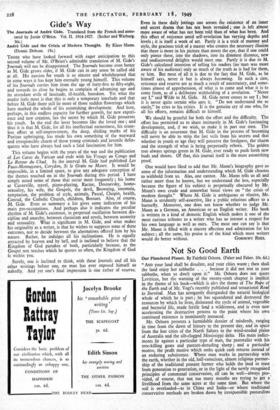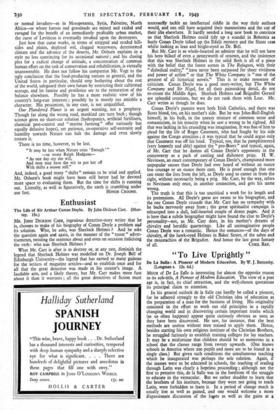Not So Good Earth
" AND your land shall be desolate, and your cities waste ; then shall the land enjoy her sabbaths .. . because it did not rest in your sabbaths, when ye dwelt upon it." Mr. Osborn does not quote Leviticus, but the warning of the twenty-sixth chapter is implicit in the theme of his book—which is als' the theme of The Rape of the Earth and of Mr. Vogt's recently published and sensational Road to Survival. Man has arrogantly disregarded the natural biological whole of which he is part ; he has squandered and destroyed the resources by which he lives, dislocated the cycle of animal, vegetable and bacterial life, made fertile land a wilderness, and is even now accelerating the destructive process to the point where his own continued existence is imminently menaced.
Mr. Osborn presents a formidable dossier of misdeeds, ranging in time from the dawn of history to the present day, and in space from the lost cities of the North Sahara to the wind-eroded plains of Australia and the silt-clogged Mississippi delta. His main indict- ments lie against a particular type of man, the pastoralist with his tree-killing goats and pasture-denuding sheep ; and a particular motive, the profit motive which seeks quick cash returns instead of an enduring subsistence. Where man works in partnership with the earth, whether in the old, half-conscious, almost religious partner- ship of the traditional peasant farmer who holds the land in trust from generation to generation, or in the light of the newly recognised principles of communal conservation, all can be well—always pro-, vided, of course, that not too many mouths are trying to get a livelihood from the same acres at the same time. But where the soil is overloaded—as in China and India—or where traditional conservative methods are broken down by irresponsible pastoralists
or nomad invaders—as in Mesopotamia, Syria, Palestine, North Africa—or where forests and grasslands are mined and raided and ravaged for the benefit of an immediately profitable urban market, the curse of Leviticus is eventually invoked upon the destroyers.
Just how that curse works, in terms of stripped and eroded hill- sides and plains, depleted soil, clogged waterways, deteriorated climate and the advance of the deserts, Mr. Osborn explains in a style no less convincing for its occasional naiveté ; and his closing plea for a radical change of attitude, a concentration of common human effort on the task of conservation and rehabilitation, is virtually unanswerable. He does not follow his compatriot Mr. Vogt to the ugly conclusion that the food-producing nations in general, and the United States in particular, should stop bothering about the rest of the world, safeguard their own future by restricting their cultivated acreage, and let famine and pestilence see to the restoration of the balance elsewhere. Possibly he has a more realistic view of his country's long-run interests ; possibly he is merely too amiable a character. His pessimism, in any case, is not unqualified.
Our Plundered Planet is an urgent warning, not a prophecy. Though far along the wrong road, mankind can turn back ; though science gives no short-cut solution (hydroponics, artificial fertilisers, chemical pest-control and " marine farming " offer variously but equally delusive hopes), yet patience, co-operative self-restraint and humility towards Nature can halt the damage and even slowly restore it.
There is no time, however, to be lost.
" It may be late when Nature cries Enough ' " —so wrote Ralph Hodgson-
" As one day cry she will, And men may have the wit to put her off With shifts a season still."
And, indeed, a good many " shifts " remain to be tried and applied.
Mr. Osbom's book might have been still better had he devoted
more space to evaluating them. But the time for shifts is running out. Literally, as well as figuratively, the earth is crumbling under







































 Previous page
Previous page